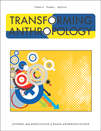
Transforming Anthropology
Scope & Guideline
Advancing Transformative Ideas in Anthropology
Introduction
Aims and Scopes
- Black Studies and Intersectionality:
The journal prioritizes research that examines the complexities of Black identities and experiences, particularly in relation to race, gender, and sexuality. This includes historical and contemporary analyses that reveal how systemic racism shapes cultural practices. - Activist and Engaged Anthropology:
A significant aim is to promote research that actively engages with social justice issues, advocating for marginalized communities and challenging oppressive structures through ethnographic work and community collaboration. - Cultural Representations and Media:
The journal explores how Blackness and racial identities are represented in various media forms. This includes studies on the impact of technology and popular culture on racial discourses and community identities. - Global and Diasporic Perspectives:
Transforming Anthropology emphasizes the importance of global contexts and diasporic experiences, offering insights into how race and identity are constructed and perceived in different cultural settings. - Decolonizing Anthropology:
The journal seeks to challenge and deconstruct colonial legacies within anthropology, promoting scholarship that critiques traditional methodologies and advocates for Indigenous and Afrocentric approaches.
Trending and Emerging
- Black Feminism and Gender Studies:
Recent articles increasingly emphasize the intersections of race and gender, particularly through the lens of Black feminist thought. This trend underscores the importance of understanding gendered experiences within racialized contexts. - Digital Anthropology and Social Media:
There is a growing interest in exploring the role of digital platforms in shaping racial and cultural identities. Research that investigates how social media impacts community engagement and representation is becoming more prevalent. - Health Disparities and Racial Justice:
Emerging themes include the examination of health inequalities faced by marginalized communities, particularly in the context of the COVID-19 pandemic. This area addresses the intersection of public health, race, and systemic inequities. - Cultural Resilience and Resistance:
A notable trend is the focus on cultural practices that promote resilience among Black communities. This includes studies on activism, spirituality, and cultural expressions that challenge oppression and foster community strength. - Transnational and Diasporic Identity Formation:
Increasingly, research is exploring how migration and transnationalism shape racial identities. This theme highlights the complexities of belonging and identity in a globalized world.
Declining or Waning
- Traditional Anthropological Methodologies:
There appears to be a decreasing emphasis on conventional ethnographic methods that lack engagement with contemporary social issues. Scholars are increasingly favoring participatory and activist approaches over traditional fieldwork. - Eurocentric Perspectives in Anthropology:
Research that centers predominantly on Eurocentric viewpoints or lacks intersectional analysis has become less frequent, as the discipline moves towards embracing diverse and inclusive narratives. - Generalized Race Theory:
The focus on broad, generalized theories of race without specific cultural contexts is diminishing. The journal increasingly favors nuanced and context-specific analyses that address the intricacies of racial identities. - Historical Studies of Race without Contemporary Relevance:
While historical perspectives are still valued, there is a waning interest in studies that do not connect past racial dynamics to current social contexts, reflecting a preference for research that informs present-day struggles.
Similar Journals

Chungara-Revista de Antropologia Chilena
Unveiling the Rich Tapestry of AnthropologyChungara-Revista de Antropologia Chilena is a premier academic journal dedicated to the field of anthropology, showcasing research and discourse that emphasize the rich cultural heritage of Chile and its surrounding regions. Published by UNIV TARAPACA, this journal serves as a vital platform for scholars, researchers, and students keen on exploring anthropological studies, ethnographic fieldwork, and cultural analysis. With an ISSN of 0717-7356, it adheres to rigorous academic standards and strives to promote open dialogue on contemporary and historical issues across various communities. Although currently not indexed in prominent metrics, its commitment to scholarly excellence contributes significantly to the academic landscape, fostering a deeper understanding of anthropological practices in Chile and beyond. Authors are encouraged to engage with the journal's rich repository of knowledge while readers gain access to pivotal insights that drive forward the discourse within anthropology.
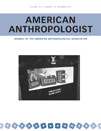
AMERICAN ANTHROPOLOGIST
Advancing anthropological discourse since 1888.American Anthropologist is a prestigious journal published by Wiley, dedicated to advancing the field of anthropology. With a rich publishing history dating back to 1888, it has become a leading platform for scholarly discourse, showcasing innovative research and diverse perspectives from around the globe. The journal holds impressive ranks within its categories, being recognized as Q1 in both Anthropology and Arts and Humanities, alongside a notable Scopus ranking of #36 out of 502 in Social Sciences. Its robust impact in academia is reflected in its emphasis on interdisciplinary approaches that resonate within the fields of social science and humanities. Researchers and students alike are encouraged to contribute to this vital resource that continues to shape anthropological thought and practice. For those interested, the journal is tailored for non-open access, ensuring the curation of high-caliber scholarly work accessible to a wide audience while supporting the standards of peer-reviewed publications.
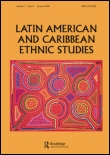
Latin American and Caribbean Ethnic Studies
Bridging Cultures: A Journey Through Ethnic LandscapesLatin American and Caribbean Ethnic Studies, published by Taylor & Francis Ltd, stands as a pivotal platform for scholarly dialogue in the realms of anthropology, cultural studies, sociology, and political science. With an ISSN of 1744-2222 and E-ISSN of 1744-2230, this journal has established itself since its inception in 2006, covering a diverse array of topics up to the year 2024. Recognized for its academic rigor, it is categorized within the Q2 and Q1 quartiles based on the 2023 rankings, showcasing its significance within these fields; it ranks in the 79th percentile for cultural studies and 62nd percentile for anthropology according to Scopus. The journal is not only an essential resource for researchers and professionals, but it also serves as an educational tool for students interested in understanding the complex ethnic landscapes of Latin America and the Caribbean. Although it is not an open access journal, its high-impact research contributions make it invaluable for those committed to advancing knowledge in these critical areas of study. This publication fosters a deeper comprehension of the intersectionality of identity, culture, and politics in these regions, thus bridging theories and practices that resonate globally.
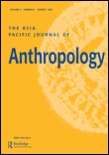
Asia Pacific Journal of Anthropology
Exploring the Rich Tapestry of Asia Pacific CulturesAsia Pacific Journal of Anthropology is a premier academic journal dedicated to advancing the field of anthropology and cultural studies, published by Routledge Journals, Taylor & Francis Ltd. With an ISSN of 1444-2213 and E-ISSN 1740-9314, this journal has gained recognition for its rigorous scholarly contributions since its inception in 2000. Situated in the UK, it is strategically positioned to serve as a vital resource for researchers, professionals, and students exploring the rich complexities of human societies and cultures within the Asia Pacific region and beyond. As evidenced by its Q2 ranking in both anthropology and cultural studies for 2023, alongside its impressive Scopus ranks—#218 among 1304 in Cultural Studies and #157 among 502 in Anthropology—this journal illustrates a strong commitment to delivering high-quality, impactful research. While it is not an open-access journal, it remains a key platform for disseminating innovative research and fostering academic dialogue, thereby significantly contributing to the advancement of knowledge in the social sciences.

Anthropological Notebooks
Navigating the Complexities of Culture and SocietyAnthropological Notebooks, published by the SLOVENE ANTHROPOLOGICAL SOC, is a noteworthy journal within the field of anthropology. Established in Slovenia, this journal aims to provide a platform for scholarly dialogue and dissemination of anthropological research, fostering interdisciplinary approaches and global perspectives. Although it currently holds a Q4 quartile ranking in anthropology and ranks #421 out of 502 in Scopus, it serves as an essential conduit for emerging voices and innovative ideas in the discipline. Covering research published from 2010 to 2019 and from 2021 to 2024, the journal invites contributions that explore diverse cultural narratives and anthropological insights. Despite its limited open access options, Anthropological Notebooks remains a crucial resource for researchers, professionals, and students seeking to engage with contemporary anthropological discourse and enrich their understanding of human societies.

DIALECTICAL ANTHROPOLOGY
Fostering Dialogue in Contemporary AnthropologyDIALECTICAL ANTHROPOLOGY, published by SPRINGER, is a prestigious journal within the field of anthropology, recognized for its substantial contributions to dialectical and critical theory in social research. Since its inception in 1975, the journal has carved a niche by exploring the intersections of culture, society, and politics, making it an essential resource for scholars and practitioners. With an impact factor that places it in the Q2 category for both anthropology and arts and humanities, and significant rankings in sociology and political science, it reflects a solid scholarly reputation. The journal operates on a subscription basis, allowing for a wide dissemination of rigorous academic research without open access. With ISSN 0304-4092 and E-ISSN 1573-0786, DIALECTICAL ANTHROPOLOGY serves as a crucial platform for fostering dialogue and advancing knowledge in contemporary anthropology and related disciplines. As a researcher, professional, or student, engaging with the insights presented in this journal will deepen your understanding of the dynamic interplay between structural and agency-oriented perspectives in social contexts.

Visual Studies
Enriching the understanding of visual practices and their impact.Visual Studies, published by Taylor & Francis Ltd, is a leading international journal that serves as a vital platform for interdisciplinary scholarship in the fields of visual arts, cultural studies, and anthropology. Established in 2002 and continuing strong through 2024, it holds impressive rankings including Q1 in Cultural Studies and Visual Arts and Performing Arts, as well as Q2 in Anthropology, reflecting its significant impact and prestige within these disciplines. With a robust Scopus ranking placing it in the 89th percentile for Visual Arts and Performing Arts, this journal does not only publish original research but also fosters rich dialogues on visual culture, representation, and critical theory. Although it is not open access, researchers, practitioners, and students alike can benefit from its rigorous peer-reviewed content, which contributes to advancing knowledge and understanding of visual phenomena. Located in the United Kingdom, Visual Studies continues to shape the conversations surrounding visual practices and their societal implications.

AMERICAN ETHNOLOGIST
Unveiling the Rich Tapestry of Human ExperienceAMERICAN ETHNOLOGIST, published by Wiley, stands as a prominent platform in the field of anthropology, with a distinguished reputation underscored by its Q1 ranking in the 2023 Category Quartiles and a notable position in the 79th percentile among its peers. With its foundation dating back to 1974 and set to continue until 2024, this journal serves as a vital resource for researchers, practitioners, and students devoted to exploring cultural dynamics and social practices across diverse communities. The journal is characterized by its commitment to advancing theoretical discussions and empirical scholarship in ethnology and related disciplines. Targeted contributions include in-depth studies, critical reviews, and innovative methodologies that engage with pressing cultural issues. Although it does not offer Open Access, the journal’s rigorous peer-review process and high-impact articles ensure the dissemination of valuable insights, enhancing scholarly engagement and professional discourse. Its ISSN is 0094-0496 and E-ISSN is 1548-1425, emphasizing its dual format accessibility, which facilitates wider readership within the anthropology community.
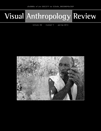
Visual Anthropology Review
Advancing Innovative Perspectives in Visual AnthropologyVisual Anthropology Review, published by WILEY, stands as a pivotal journal within the fields of Anthropology and Arts and Humanities. With both ISSN 1058-7187 and E-ISSN 1548-7458, this journal has been disseminating interdisciplinary knowledge since its inception in 1991, facilitating vibrant dialogues through to 2024. Recognized with a Q2 quartile ranking in the 2023 metrics, it places itself within the top tiers of both associated categories, offering a significant platform for researchers and professionals to publish high-quality research. Although not an Open Access publication, Visual Anthropology Review maintains a robust impact within its disciplines, as reflected in its Scopus rankings: 253rd out of 552 in the Arts and Humanities category and 244th out of 502 in the Social Sciences category, illustrating its substantial contribution to contemporary anthropological discourse. The journal's scope encompasses various dimensions of visual culture, encouraging forward-thinking analysis and innovative methodologies, making it an invaluable resource for academics and students eager to explore the intersection of visual media and anthropological inquiry.

Revista Espanola de Antropologia Americana
Engaging Minds in the Study of American SocietiesRevista Española de Antropología Americana, published by UNIV COMPLUTENSE MADRID, SERVICIO PUBLICACIONES, stands as a significant contribution to the field of anthropology, particularly focusing on American societies and cultures. Since its inception in 1970, this journal has evolved, with issues currently being published until 2024, providing a platform for original research, reviews, and scholarly discourse. Despite being a Q3 category journal in the 2023 rankings, it plays a pivotal role in disseminating knowledge and stimulating academic debate within the anthropology community. With an ISSN of 0556-6533 and an E-ISSN of 1988-2718, Revista Española de Antropología Americana strives to engage researchers, professionals, and students with insightful content that reflects the dynamic nature of cultural studies. Although it operates under traditional access models, the rich array of topics covered ensures its relevance to ongoing scholarly conversation in social sciences and anthropology. Addressing a diverse array of anthropological themes, this journal is essential for anyone looking to deepen their understanding of the cultural frameworks shaping American societies.